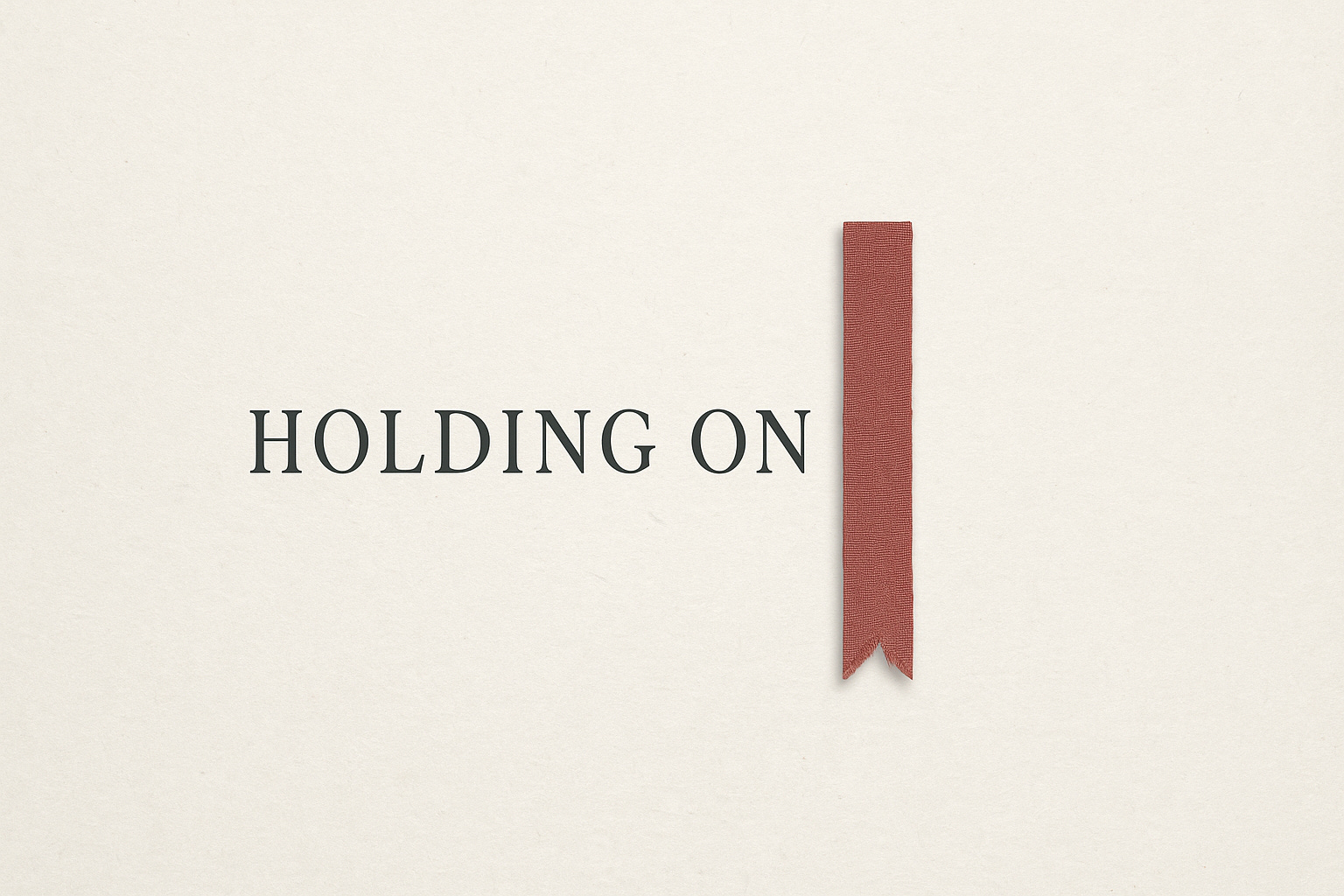Welcome to the beginning of Holding On.
If you’ve been reading my essays or poetry for a while, you’ll know I often return to the quiet spaces: the in-between moments, the held silences, the conversations that don’t quite land but still mean something.
Holding On is built from that same fabric. It’s a novel, yes—but more than that, it’s a story about memory, family, and the ache of not knowing when goodbye really begins. It follows Rachel and her family as they try to shape something meaningful out of loss—not to resolve it, but to share it, however imperfectly.
Some of you have read my reflections on grief before—the ones that arrive wrapped in memory, or stitched into scarlet thread, or hidden behind humor that lands just a little too hard. This story carries all of that. But slower. Gentler. Letting the ache breathe between lines.
I’ll be sharing Holding On one chapter at a time, each week. I don’t know exactly how it will feel to release it like this—raw, unfolding—but I do know stories are meant to be held. And I trust you to help me hold this one.
Thank you for being here.
And if this chapter stays with you, feel free to share it—or just sit with it. Either is enough.
Chapter One
Rachel hated the waiting.
The soft hum of fluorescent lights. The muffled shuffle of footsteps outside the green room door. Even the beige walls felt tense, like they were holding their breath. She shifted in her seat, the synthetic leather chair clinging to her blouse.
The book in her lap—Can We Keep It?—gleamed under the overhead lights. She traced the curve of the question mark on the embossed title, her thumb catching on the gloss. The words had felt so simple when Emma first suggested them, rooted in a single, painful memory. But now, under studio lighting and national scrutiny, they felt like a dare.
What am I doing here?
The thought struck hard. Their story had been private—grief-soaked, tender, still unfinished. What if no one understood? What if they reduced it to soundbites and sentiment? What if turning it into a story meant losing what had made it theirs?
Was she even the right one to speak for them—for Emma, for her parents—for the story itself?
She adjusted her blouse again, palms damp, gaze fixed on the door. Behind it, cameras were being tested, microphones adjusted, and an audience waited. Lorraine Kelly had breezed through earlier—gracious, effortless. Rachel had locked up the moment she left.
The book’s weight grounded her. Eighteen months. They’d sifted through memories, confronted silences. Emma’s drawings had started as therapy. But it was Emma who found the story, who gave shape to grief. Rachel had followed, never quite believing they’d finish it—let alone sit here.
“You’re overthinking again,” Emma said.
Rachel looked up. Emma was perched on the arm of the couch, one leg tucked under her, the other swinging gently. At nearly fourteen, she carried herself with a calm that sometimes startled Rachel. But there was a tell—her thumb rubbed the corner of her sketchbook, rhythmic and unconscious, like she was trying to look more relaxed than she felt.
“I’m not overthinking,” Rachel muttered.
Emma set her phone aside. “You won’t mess it up. You already did the hard part. This... this is just telling people why it matters.”
Rachel sighed. “It just feels… too personal. What if it doesn’t land the way we meant it to?”
Emma shrugged, but her voice softened. “It is personal. But it’s not just ours. People need to know they’re not alone.” She met Rachel’s eyes. “And Grandad would’ve told you to stop fussing and get on with it. Probably while singing Barry White.”
Rachel laughed despite herself. “You’re right. He would.”
She could almost hear it—his deep voice crooning You’re the First, the Last, My Everything. Part joke. Part comfort. Part benediction.
A knock at the door broke the moment. “Two minutes!” called the producer, brisk but friendly.
Rachel stood. The polished cover of the book felt slick in her hands. Emma was already up, sketchbook tucked under her arm like armor.
“Ready?” Emma asked.
Rachel hesitated at the door, her fingers tightening on the book. No, she didn’t feel ready. But she wasn’t about to let Emma step into the light alone.
“I am now,” she said.
Emma stepped ahead.
Rachel lingered for a breath, letting the book’s weight anchor her. What would they have thought—her parents—seeing all this? The cameras, the lights, their story told aloud?
Her dad would have teased her for overthinking. Her mum would’ve just given her that look. You’re stronger than you think.
Rachel swallowed hard.
Not now, she told herself. No room for grief under studio lights.
Even as she stepped into the studio, the glare caught the glossy cover of the book—bright, too bright—like it was still asking a question she couldn’t yet answer.
But the weight of memory pulled her back.
Back to the room. The silence.
Where the story really began.
If this chapter resonates...
Subscribe to follow the story week by week, or share it with someone who understands the quiet ache of holding on.



Beautiful! Can’t wait for the next installment.
This is such a strong beginning. I love this. Can't wait to see what comes next. You are my 415th bedtime story. :)